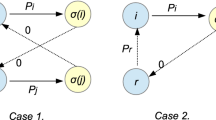Abstract
Job-Shop Scheduling (JSS) problems are among the more difficult to solve in the class of NP-complete problems. The only successful approach has been branch-and-bound based algorithms, but such algorithms depend heavily on good bound functions. Much work has been done to identify such functions for the JSS problem, but with limited success. Even with recent methods, it is still not possible to solve problems substantially larger than 10machines and 10 jobs. In the current study, we focus on parallel methods for solving JSS problems. We implement two different parallel branch-and-bound algorithms for JSS on a16-processor MEIKO Computing Surface with Intel i860 processors and perform extensive computational testing using classical publicly available benchmark problems. The parallel part of one of the implementations is based on a similar parallel code for Quadratic Assignment Problems. Results are reported for different branching rules proposed in the literature.
Similar content being viewed by others
Explore related subjects
Discover the latest articles and news from researchers in related subjects, suggested using machine learning.References
J. Adams, E. Balas and D. Zawack, The Shifting Bottleneck procedure for job-shop scheduling, Management Science 34(1988)391–401.
D. Applegate and W. Cook, A computational study of the job-shop scheduling problem, ORSA Journal on Computing 3(1991)149–156.
E. Balas and A. Vazacopoulos, Guided local search with Shifting Bottleneck for job shop scheduling, Management Science Report MSRR-609, Carnegie Mellon University, 1994.
J.E. Beasley, Operations Research Library of Problems, available via anonymous FTP from mscmga. ms.ic.ac.uk (155.198.66.4).
P. Brucker and B. Jürisch, A new lower bound for the job-shop scheduling problem, European Journal of Operational Research 64(1993)156–167.
P. Brucker, B. Jürisch and B. Sievers, A branch-and-bound algorithm for the job-shop scheduling problem, Discrete Applied Mathematics 49(1994)107–127.
J. Carlier, The one-machine sequencing problem, European Journal of Operational Research 11 (1982)42–47.
J. Carlier and E. Pinson, A practical use of Jackson's Preemptive Schedule for solving the job-shop problem, Annals of Operations Research 26(1990)269–287.
J. Carlier and E. Pinson, An algorithm for solving the job-shop problem, Management Science 35 (1989)164–176.
J. Carlier and E. Pinson, Adjustment of heads and tails for the job-shop scheduling problem, European Journal of Operational Research 78(1994)146–161.
J. Clausen and M. Perregaard, Solving large Quadratic Assignment Problems in parallel, to appear in Computational Optimization and Applications.
J. Grabowski, E. Nowicki and S. Zdrzalka, A block approach for single-machine scheduling with release dates and due dates, European Journal of Operational Research 26(1986)278–285.
P.S. Laursen, Simple approaches to parallel branch and bound, Parallel Computing 19(1993) 143–152.
J.K. Lenstra, A.H.G. Rinnooy Kan and P. Brucker, Complexity of machine scheduling problems, Annals of Discrete Mathematics 1(1977)343–362.).
J.F. Muth and G.L. Thompson, Industrial Scheduling, Prentice-Hall, 1963.
Rights and permissions
About this article
Cite this article
Perregaard, M., Clausen, J. Parallel branch-and-bound methods for thejob-shop scheduling problem. Annals of Operations Research 83, 137–160 (1998). https://doi.org/10.1023/A:1018903912673
Issue Date:
DOI: https://doi.org/10.1023/A:1018903912673




